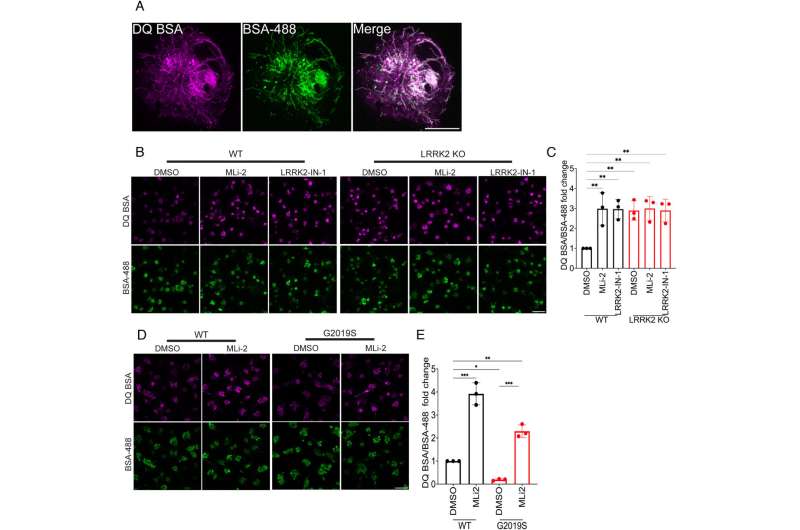This article has been reviewed according to Science X's editorial process and policies. Editors have highlighted the following attributes while ensuring the content's credibility:
fact-checked
peer-reviewed publication
trusted source
proofread
Study reveals insights into link between genetic mutation and Parkinson's

The role played by mutations in the LRRK2 gene in promoting Parkinson's disease has long intrigued scientists, and even led to an experimental drug that inhibits the over-active protein. Yet exactly how LRRK2 triggers this devastating neurodegenerative disease has been unclear.
In a new study, Yale researchers reveal new insights into this question, finding that the LRRK2 gene can suppress activity in lysosomes, microscopic organelles that play a key role in breaking down and disposing of cellular waste. The findings were published July 24 in the Proceedings of the National Academy of Sciences.
LRRK2 genes can also reduce activity of macrophages and microglia, specialized cells that act as the body's scavengers, clearing away misfolded proteins, cell debris, dead cells, and pathogens, the researchers found. In the brain, microglia help protect neurons from threats posed by these excess materials.
The loss of such protective functions as a result of LRRK2 genetic mutations could explain the link between LRRK2 and Parkinson's disease, the researchers say. Furthermore, outside the brain, the suppression of lysosomes by LRRK2 in macrophages may help explain links between LRRK2 and other diseases including leprosy and Crohn's disease.
"LRRK2 acts like a brake on a garbage truck and if the brake is too strong it limits the ability of these scavenger cells to eliminate damaging material," said Shawn Ferguson, associate professor of cell biology and of neuroscience at Yale School of Medicine and senior author of the study.
In the study, Ferguson and Narayana Yadavalli, a postdoctoral associate at Yale, also identified key downstream targets that mediate the ability of LRRK2 to suppress lysosome degradative activity. These insights may lead to new therapies not only for Parkinson's disease but also for other neurodegenerative diseases arising from lysosome dysfunction, they say.
These findings combined suggest that an ongoing Phase 3 trial of an LRRK2 inhibitor for the treatment of Parkinson's, which is being run by Biogen and Denali Therapeutics, may successfully restore lysosome activity in microglia, Ferguson suggested.
But caution is warranted, he said, since there may be risks with weakening the ability of LRRK2 to serve as a brake, which might unleash an excessive cellular cleanup that could harm healthy cells.
More information: Narayana Yadavalli et al, LRRK2 suppresses lysosome degradative activity in macrophages and microglia through MiT-TFE transcription factor inhibition, Proceedings of the National Academy of Sciences (2023). DOI: 10.1073/pnas.2303789120




















